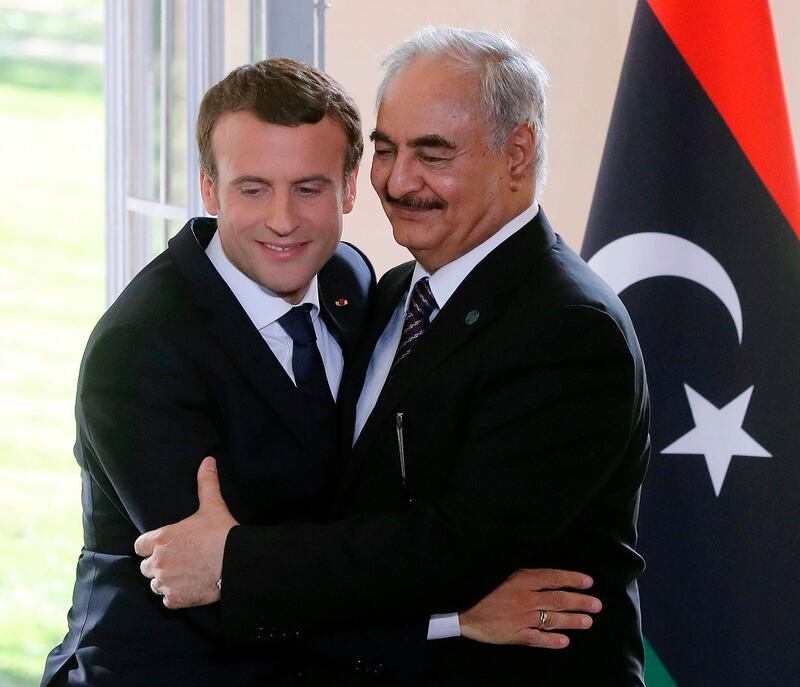French President Emmanuel Macron’s reputation as a staunch supporter of European solidarity appears to be somewhat at odds with his recent meddling in the Libyan conflict.
Ever since he was elected to office in 2017, Mr Macron has positioned himself as the cheerleader for ever-closer European co-operation – a vision in which European powers act as a collective force rather than pursuing their individual national interests.
In particular, in pursuit of his federalist agenda, Mr Macron has spoken openly of the need for the European Union to establish institutions that will help to forge closer co-operation on defence and security issues. To this end, for example, he has championed the creation of a European Defence Force that could protect the continent from future threats, rather than having to rely on Nato, the traditional defender of western security.
And yet, when it comes to Libya, Mr Macron appears to have abandoned his commitment to European unity by pursuing a policy that is totally focused on French interests, while putting Paris on a collision course with other key European allies, such as Italy.
Concerns about France’s involvement in the recent escalation of hostilities in Libya stem from reports that Field Marshal Khalifa Haftar, the head of the Libyan National Army (LNA), launched his bid to capture Tripoli, the country’s capital, shortly after visiting Paris in early April, where he met with a number of senior French defence, security and foreign policy officials, including the hawkish foreign minister Jean-Yves Le Drian.
French special forces are already known to be based in the eastern area of Libya controlled by Field Marshal Haftar’s forces, where they have been helping to train the LNA.
But the timing of Field Marshal Haftar’s visit to Paris has raised suspicions, particularly in Rome, that the French are clandestinely supporting the LNA in Libya against the UN-backed government of Prime Minister Fayez Al Sarraj.
Indeed, the LNA’s advance was launched on the very day that UN secretary-general Antonio Guterres had arrived in Tripoli for a new round of peace talks aimed at ending the stand-off between Field Marshal Haftar, the leader of the eastern, coastal region of Cyrenaica, and Mr Al Sarraj’s Government of National Accord (GNA), which has the backing of European powers such as Britain and Italy, as well as the US and UN.
Now the Italians are accusing Mr Macron of personally endorsing Field Marshal Haftar’s military effort to overthrow the GNA, thereby seriously undermining the French president’s credibility as a champion of European solidarity.
Italian intelligence sources claim that Field Marshal Haftar received French support during his Paris visit, which has led Matteo Salvini, Italy’s deputy prime minister and leader of the far-right Lega Nord party, to question openly France’s role in the latest escalation of hostilities in Libya.
Mr Salvini said the Italian government was "weighing up carefully whether France is in any way mixed up in these armed clashes in Libya and, if France is blocking a European peace initiative and instead backing one side, it would be a very grave matter".
While France has denied any involvement in Field Marshal Haftar’s offensive, its diplomatic response to the situation in Libya certainly puts it at odds with the rest of its EU allies. European divisions on the issue were exposed when it was revealed that France had blocked a draft EU resolution calling on the LNA to end its assault on Tripoli and withdraw its forces.
Irrespective of the contribution Mr Macron may or may not have made to the recent dramatic escalation of the Libyan crisis, the fact remains that the Field Marshal's advance has so far claimed the lives of around 200 people, and missiles continue to be fired indiscriminately into residential areas of a city of three million people, the majority of them civilians.
Furthermore, all the indications are that the LNA’s advance has faltered in the face of the fierce resistance of the various militias associated with the GNA, who believe that maintaining support for the UN-backed administration is the best way of resolving the lawlessness that has plagued the country since the overthrow of Colonel Muammar Gaddafi in 2011.
Certainly, France should recognise that its long-term interests would be better served by supporting UN-led efforts to end the fighting that pursuing its own agenda in Libya.
Although Paris says it supports the GNA, it remains sceptical about its ability to unite Libya, claiming that the country is little more than a front for Islamist extremists and the terror networks responsible for Europe’s migrant crisis.
France's geographical proximity to North Africa means it is an obvious target for people traffickers, especially since Italy's coalition government adopted a more robust approach to migrants. France is also vulnerable to Islamist terror groups based in the region, which have already succeeded in carrying out a number of high-profile attacks on French soil.
But the French authorities should understand that both the flow of migrants and the terror threat are likely to escalate if there is a further spike in the violence in Libya, which seems increasingly likely if Field Marshal Haftar’s forces prove incapable of achieving the breakthrough in Tripoli that they desire.
In which case, rather than pursuing his own national self-interest, Mr Macron should live up to his reputation as a politician who believes in western solidarity, and back diplomatic efforts at the UN to resolve the crisis and end the fighting.
Con Coughlin is the Daily Telegraph’s defence and foreign affairs editor





